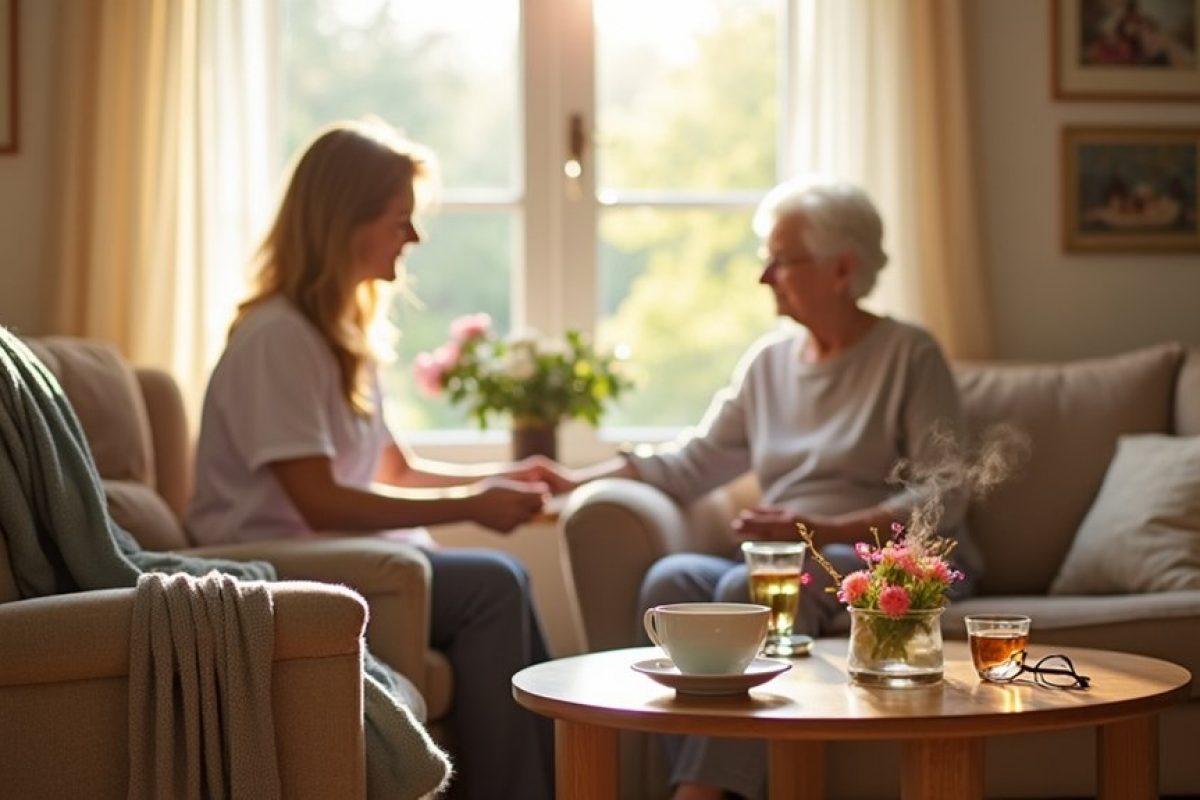Balancing personal care and home comfort for seniors means understanding their unique needs while creating a safe, inviting space. Start by evaluating daily routines and preferences, eliminating tripping hazards, and fostering a nurturing environment with familiar items. Establish consistent personal care routines and encourage participation in daily tasks. You’ll support their emotional well-being through meaningful social interactions and engaging activities. There’s so much more to explore on how to enhance their quality of life seamlessly.
Key Takeaways
- Engage seniors in discussions about their care preferences to tailor personal care routines that enhance comfort and emotional well-being.
- Create a safe and accessible living space by removing hazards and providing adequate lighting to promote independence.
- Incorporate familiar items and personal touches in the home environment to evoke positive memories and foster emotional security.
- Establish consistent personal care schedules while allowing seniors to make choices in grooming and dressing to encourage self-sufficiency.
- Facilitate regular social interactions and community engagement to combat isolation and enhance overall quality of life.
Assessing Individual Needs and Preferences
How do you determine what your loved one truly needs and wants? Start by engaging in open conversations. Ask questions about their daily routines, preferences, and any challenges they face.
Listen carefully to their responses, as these insights are invaluable. Observe their behavior and environment, noting anything that seems to cause discomfort or frustration.
It’s also helpful to involve them in decision-making, empowering them to express their desires regarding care and lifestyle. Consider their physical, emotional, and social needs, as these play a substantial role in their overall well-being. Additionally, be aware that nearly 60% of caregivers report significant emotional stress, which can affect their ability to provide care effectively.
Creating a Safe and Accessible Living Space
Creating a safe and accessible living space is essential for enhancing your loved one’s independence and well-being. Start by removing tripping hazards like loose rugs and clutter.
Creating a safe living space enhances independence and well-being by eliminating tripping hazards and ensuring clear pathways.
Make certain that pathways are clear and well-lit, especially at night. Install grab bars in key areas, such as bathrooms, to provide support where it’s needed most.
Consider using furniture that’s easy to navigate around, and make sure that frequently used items are within reach. If mobility is an issue, think about rearranging the layout to facilitate movement.
Additionally, adequate lighting can greatly improve safety; use brighter bulbs or night lights. By making these adjustments, you’ll create an environment that not only promotes comfort but also empowers your loved one to thrive. Regular exercise can also enhance balance and flexibility, which are crucial for preventing falls.
Incorporating Personal Care Routines
While maintaining a sense of dignity and independence, incorporating personal care routines into your loved one’s daily life can considerably enhance their quality of life.
Start by establishing a consistent schedule that includes activities like bathing, grooming, and dressing. These routines provide structure and familiarity, making your loved one feel more secure.
Offer choices in their preferences, whether it’s selecting a favorite soap or deciding on an outfit. This empowers them and fosters autonomy.
Additionally, involve them in the process, turning tasks into shared moments rather than chores. Whether you’re brushing hair or organizing medications, these small acts of care create connection.
Ultimately, a thoughtful personal care routine not only promotes hygiene but also nurtures emotional well-being and strengthens your bond. Regular assistance with Activities of Daily Living ensures that their needs are met while enhancing their confidence and independence.
Enhancing Emotional Well-Being Through Environment
The environment in which your loved one lives plays a significant role in their emotional well-being. By creating a warm, inviting space, you can help foster a sense of security and comfort.
Consider incorporating familiar items, like family photos or cherished keepsakes, to evoke positive memories. Natural light and fresh air can uplift moods, so make sure windows are clean and curtains let in sunlight.
Soft textures, soothing colors, and calming scents can further enhance their surroundings. Personal touches, such as favorite art pieces or plants, can spark joy and connection.
Regularly engaging in conversations about their preferences will help you create an environment that truly reflects their personality, promoting happiness and emotional stability in their daily life. Additionally, home health care professionals can assist in ensuring that the environment is safe and supportive for your loved one’s needs.
Encouraging Independence and Engagement
Encouraging independence and engagement is essential for seniors, as it boosts their confidence and enhances their overall quality of life.
You can foster this by creating an environment that promotes self-sufficiency. Encourage seniors to participate in daily tasks, like cooking or gardening, which can provide a sense of accomplishment.
Offer choices in activities they enjoy, whether it’s arts and crafts or book clubs, to keep their minds active and engaged. Regular social interactions, through community events or family visits, can also help combat feelings of isolation. Additionally, incorporating respite care services can provide caregivers with necessary breaks while ensuring seniors receive quality care and companionship.
Frequently Asked Questions
What Financial Resources Are Available for Senior Personal Care Services?
When you’re looking for financial resources for senior personal care services, consider options like Medicaid, which often covers various home care services.
You might explore veterans’ benefits if applicable, and don’t forget about local programs that provide assistance based on income.
Additionally, long-term care insurance can help with costs.
It’s crucial to research community organizations or non-profits that offer financial aid or support services tailored to seniors in need.
How Can Technology Assist in Senior Home Comfort?
Technology can greatly enhance senior home comfort. You can use smart home devices to control lighting and temperature, creating a cozy environment.
Voice-activated assistants help seniors manage daily tasks, from setting reminders to playing music. Wearable health devices monitor essential signs, ensuring peace of mind.
You might also consider video calling apps to keep loved ones connected, reducing feelings of isolation. Embracing these technologies can transform a senior’s living experience for the better.
What Types of Home Modifications Improve Safety for Seniors?
To improve safety for seniors, you can make several home modifications.
Start by installing grab bars in bathrooms and hallways, making it easier for them to move around.
Remove trip hazards like loose rugs and clutter, and guarantee good lighting throughout the home.
Consider adding non-slip flooring and a shower seat for added security.
Finally, a medical alert system can provide peace of mind, ensuring help is available when needed.
How Can Families Communicate Effectively About Care Preferences?
To communicate effectively about care preferences, start by creating a safe space for open dialogue.
Ask questions that encourage honesty and listen actively to understand each other’s perspectives.
Use clear and compassionate language to express your thoughts and feelings.
It’s essential to check in regularly, ensuring everyone feels heard and valued.
What Are the Signs That a Senior Needs More Support?
You might notice several signs that indicate a senior needs more support.
Look for changes in their daily routines, like difficulty with personal hygiene or managing medications. If they’re experiencing frequent falls or showing signs of confusion, it’s time to step in.
Additionally, if their home appears unkempt or they’re losing weight, these can signal a need for extra help.
Trust your instincts; staying attentive can make all the difference in their well-being.





